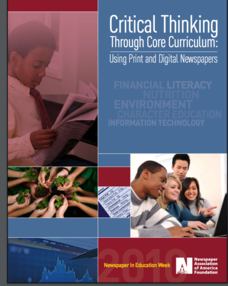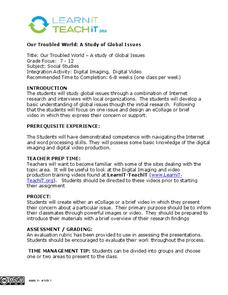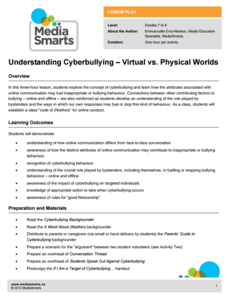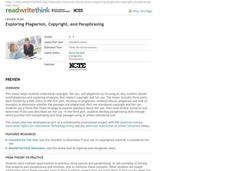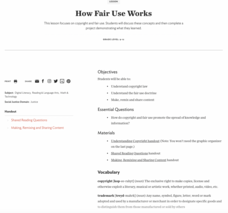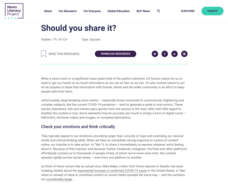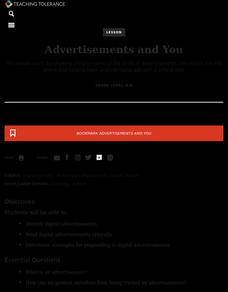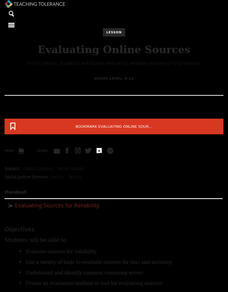Advocates for Human Rights
Human Rights in the U.S.
Here's a fun, creative approach to the profoundly important issue of human rights. Young citizens do three activities, two of which involve them finding images from magazines that reflect human rights of their choosing and creating a...
Newspaper Association of America
Critical Thinking through Core Curriculum: Using Print and Digital Newspapers
What is and what will be the role of newspapers in the future? Keeping this essential question in mind, class members use print, electronic, and/or web editions of newspapers, to investigate topics that include financial literary,...
Florida Department of Health
Safe and Happy: Safety for All at School and Online Unit
Bystander or upstander and advocate? Three lessons have high schoolers investigating data about bullying and school safety. Participants then learn how to take a stand against bullying and use what they have learned to create a PSA to...
Curated OER
7 Habits
Students study the qualities and responsibilities of becoming a good citizen. They, in teams, produce a video of one of the habits from the 7 Habits for Highly Effective Teens program.
Curated OER
Our Troubled World: A Study of Global Issues
Young scholars analyze global issues. In this research skills lesson, students research selected global issues. Young scholars create e-collages or digital videos that feature their selected issues.
Curated OER
Living History: Documenting Our Senior Citizens Lives
Students investigate stereotypes by researching the elderly. In this senior citizen lesson, students interview elders in a rest home and video tape their experience. Students present their videos to their interview subjects after and...
Florida Center for Instructional Technology
Communicating with Mentors
Nothing says 21st century learning skills like an Internet-based collaborative learning lesson plan focused on using technology to compile and synthesize information. An embedded video shows you what collaborative learning in high school...
Deliberating in a Democracy
Cyberbullying—Lesson Plan
Learners examine cyberbullying. In this lesson on democracy, students discuss the different ways to deal with cyberbullying. They then take a position on the question of whether a democracy should allow schools to take action against off...
Media Smarts
Understanding Cyberbullying — Virtual vs. Physical Worlds
Spend a few days discussing cyberbullying with an engaging lesson plan. Opening discussion questions get the conversation started while quotes and articles continue thoughtful dialogue. Small group activities and role-play scenarios...
Curated OER
Linking Social Networking to Language Arts
How to tap into students' social networking experiences to enhance learning in the language arts classroom.
ReadWriteThink
Exploring Plagiarism, Copyright, and Paraphrasing
Plagiarism, copyright, and fair use are the focus of a three-part instructional activity designed to inform scholars of how to properly cite others' work. First, pupils use a KWL chart to begin thinking and discussing plagiarism. They...
Purdue University
Email Etiquette for Students
What's the best way to discuss a problem or concern with a professor? Using a helpful PowerPoint, scholars learn how to use e-mail to communicate effectively with their instructors. They discover good and bad e-mail topics, appropriate...
Teaching Tolerance
Media Consumers and Creators, What Are Your Rights and Responsibilities?
Teach the class to separate fact from fiction. Scholars explore the topic of fake news as they read PEN America's News Consumers' Bill of Rights and discuss the rights and responsibilities outlined in the bill. Next, they read an article...
Teaching Tolerance
You Are the Product
What does it mean for a product or service to go viral? Scholars explore the topic by reading an article about the economics of social media. After reading, they complete a 3-2-1 data chart with information they learned from the text and...
Teaching Tolerance
News Consumers' Bill of Rights and Responsibilities
Believe it or not, people have rights as new consumers. Scholars read PEN America's News Consumers' Bill of Rights and Responsibilities and work in small groups to paraphrase chosen sections of the text. Next, they create and present...
Teaching Tolerance
How Fair Use Works
What's fair is fair! Using the resource, scholars discuss the key differences between fair use and copyright. Next, in small groups, pupils create and present projects that demonstrate fair use of copyrighted material, such as a song,...
News Literacy Project
Should You Share It?
Sharing isn't always caring. Scholars learn how to reduce the spread of misinformation on the Internet. They take an online quiz of example posts targeted to a specific audience. Using critical thinking skills, they see if they can tell...
News Literacy Project
Fighting Falsehoods on Social Media
It's time to stop misinformation in its tracks. Scholars take an online quiz to see how well they understand social media platforms' policies on spreading false information. After taking the quiz, pupils receive a score with an...
Teaching Tolerance
Understanding and Evaluating Online Searches
With billions of options to choose from, how can people determine which online sources are reliable? Using an informative resource, pupils first discuss and evaluate a sample search result handout. Next, partners create a checklist for...
Teaching Tolerance
Social Media for Social Action
Engage in activism, not slacktivism! Scholars discuss social media and the Internet as tools for social change. Next, they engage in a close reading strategy called Thinking Notes as they read an article about social media activism.
Teaching Tolerance
Understanding Online Searches
Discover what's behind an online search. Scholars read a handout and engage in discussions to learn how to critically evaluate online search results. Then, working in small groups, they create posters listing their demands for search...
Teaching Tolerance
Activism Online
People can make a difference in the world without leaving their homes. Using an eye-opening resource, scholars complete a handout as they consider the strengths and weaknesses of the Internet as a tool for social activism. Finally,...
Teaching Tolerance
Advertisements and You
Watch out for clever advertisements! Using the lesson plan, scholars learn how to identify online ads and respond to them critically. They then use what they've learned to develop a list of strategies to evaluate web pages.
Teaching Tolerance
Evaluating Online Sources
Newspapers, television, social media ... how do people get their news? Using the informative resource, scholars locate and verify credible sources of information. Working in small groups, they discuss strategies for evaluating the...
Other popular searches
- Computer Netiquette
- Internet Netiquette
- Technology Ethics Netiquette
- Email Netiquette
- Computer Safety and Privacy
- Computer Safety Rules
- Netiquette Lesson Plan
- Netiquette and the Internet
- Netiquette Leson Plan
- Emoticons and Netiquette
- Netiquette of Teachers
- Computer Safety for Kids



